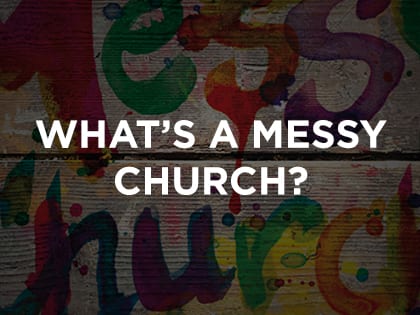If nothing else, the name Messy Church was an inspiration. It invites the question, “What on earth is it?” and makes people smile. The idea comes partly from the observation in Pete Ward’s book Liquid Church that “a liquid church will have fuzzy edges.”
Pete uses parents and toddler groups as an example of a network close to the church community when he says:
“With the parents and tots we see that the network of connections spreads from those inside the church to those who may have no connection with regular Sunday worship. When we start to regard the network itself as church, then the notion of insiders and outsiders starts to break down. Instead, we have a network of communication and relationship where Christian love and mutual support form part of the flow. The boundaries have started to become more fuzzy and less well defined.”
There’s a certain point at which a person might have friends in church, pray occasionally, attend a Communion service and try to make the annual tent sale, but they’d think it strange to go to a small group or to be asked to put more than a few bucks in the offering plate. In the nicest possible sense, they’re part of the messy edge, neither out nor in. So networks are fuzzy, and church is on the messy edge of the fuzzy networks. Life isn’t tidy.
We suppose the fuzziness is an apt reflection of the way many of us journey messily toward God. There might be those mountain top experiences of spiritual delirium. Equally, there might be lots of gentle moments when the Spirit nudges us a little further into his arms through a smile from a child, a moment of awe and wonder at the beauty of nature, a new thought about an old Bible story or a caring word from a fellow traveler. It’s a messy way of working, but surely a Father God who can invent a starfish and who is happy to work through people like us, like you, must have a creatively messy streak in him? His created world isn’t renowned for its tidiness. There is order and pattern, but when did you last see a symmetrical tree that never shed a leaf? Jesus spent most of his time not at the religious center of Jerusalem but out on the messy fringes of Jewish society among the ambiguous collaborators, the foreign settlers, the prostitutes and shifty dealers, the scruffy disciples and children.
Perhaps we would like people to be clear-cut: either a Christian or not, a member of the church or an outsider. Life would be so much easier. Yes, there comes a point when many of us can say, “Yep, I’m a Christian” with the same certainty that we can say, “Yep, I’m married,” but surely on the way the journey to faith involves bits of belonging, a little believing and a certain amount of ownership all swirling around together in a life-changing primeval soup while the Spirit works in us to bring us nearer to Jesus in our many different ways.
If this is true, you soon arrive at a church that not only is a joyful mess but also that makes a mess joyfully. While the second half of this book contains outlines of sessions for people who want the basis of a ready-made program, the book’s main intention is to kickstart some thinking about what particular form your fresh expression of church might take. Your end product will have a creative impulse and drive if it comes from your prayer, people, needs, talents, and assets rather than if you simply implement what we’ve come up with here.
Tell me more about this book »
Order this book from Amazon.com »
Taken from Messy Church by Lucy Moore and Jane Leadbetter. Copyright (c) 2017 by Lucy Moore and Jane Leadbetter. Published by InterVarsity Press, Downers Grove, IL. IVPress.com

